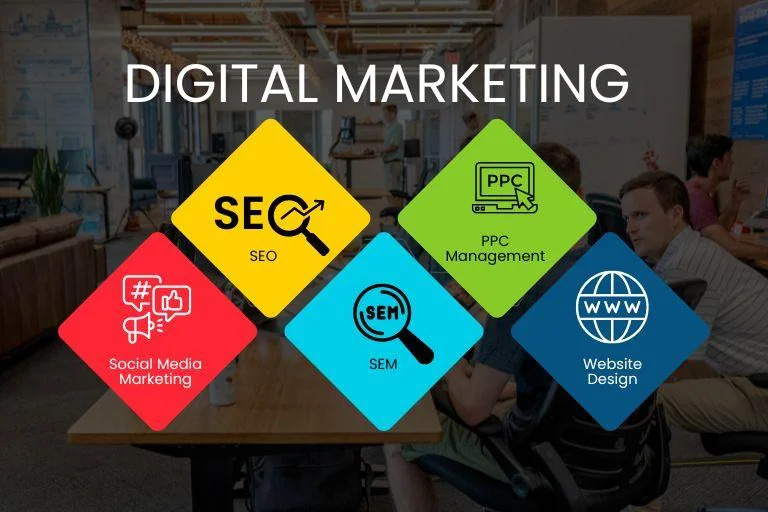Advanced Digital Marketing KPIs That Get Results
- ghulamabbas7474614
- Jul 28, 2025
- 4 min read
In today’s competitive online landscape, simply running campaigns isn’t enough. Success for any Digital Marketing Agency hinges on tracking the right Key Performance Indicators (KPIs) that directly reflect business goals. Advanced KPIs not only measure performance but also guide strategic decisions that drive real results. This article will walk you through the essential digital marketing KPIs, their benefits, and how a Digital Marketing Agency can leverage them for maximum ROI.

What Are Digital Marketing KPIs?
KPIs, or Key Performance Indicators, are measurable values that demonstrate how effectively a business is achieving key objectives. For a Digital Marketing Agency, KPIs are vital to assess campaign success across channels like SEO, PPC, social media, and content marketing.
Unlike vanity metrics such as likes or page views, advanced KPIs focus on performance outcomes that align with business objectives like lead generation, customer retention, and revenue growth.
Why KPIs Are Crucial for a Digital Marketing Agency
A professional Digital Marketing Agency understands that KPIs provide clear benchmarks for success. They:
Measure Progress Accurately: KPIs highlight which strategies are working and which aren’t.
Align Marketing with Business Goals: Every campaign is tracked against business objectives.
Enhance Client Transparency: Regular KPI reports build trust with clients by showing real-time performance.
Optimize Marketing Spend: Agencies can allocate budgets effectively based on KPI data.
Essential Advanced Digital Marketing KPIs
1. Customer Acquisition Cost (CAC)
CAC measures the total cost of acquiring a new customer through marketing and sales efforts. For a Digital Marketing Agency, this KPI indicates the efficiency of campaigns.
Formula:CAC = Total Marketing Spend / Number of New Customers Acquired
A lower CAC means better cost efficiency and a higher return on investment (ROI).
2. Customer Lifetime Value (CLV)
CLV forecasts the total revenue a business can expect from a single customer over their lifetime. By comparing CLV with CAC, a Digital Marketing Agency can assess profitability.
Why It Matters:It’s cheaper to retain customers than acquire new ones. Increasing CLV enhances long-term revenue.
3. Conversion Rate by Channel
Tracking the conversion rate (visitors who take a desired action) by channel—whether it’s SEO, PPC, or social media—allows a Digital Marketing Agency to identify which platforms yield the best results.
How to Use It:
Optimize high-converting channels.
Improve underperforming channels with A/B testing.
4. Return on Ad Spend (ROAS)
ROAS measures the effectiveness of paid advertising campaigns. It tells a Digital Marketing Agency how much revenue is generated per dollar spent on ads.
Formula:ROAS = (Revenue from Ads / Cost of Ads) x 100
A high ROAS indicates a profitable ad campaign.
5. Organic Traffic Growth
For agencies focusing on SEO, tracking organic traffic growth is essential. An increase in organic visits indicates successful keyword strategies and content optimization.
Tip:Use Google Analytics to monitor organic traffic trends and adjust SEO tactics accordingly.
6. Engagement Rate
An often-overlooked metric, engagement rate measures how actively users interact with content—likes, shares, comments, and clicks. A Digital Marketing Agency should track this across social media and blog content to gauge audience interest.
7. Lead-to-Customer Conversion Rate
This KPI tracks how many marketing-qualified leads (MQLs) turn into paying customers. It helps a Digital Marketing Agency evaluate the quality of its leads and the effectiveness of the sales funnel.
8. Bounce Rate and Dwell Time
A high bounce rate coupled with low dwell time signals issues with site content or UX design. For a Digital Marketing Agency, improving these metrics enhances user experience and boosts search rankings.
9. Email Open and Click-Through Rates (CTR)
Email marketing remains a powerful tool. Monitoring open rates and CTR allows agencies to fine-tune email subject lines, content, and CTAs for better performance.
10. Net Promoter Score (NPS)
NPS measures customer loyalty and satisfaction. It’s a strong indicator of how likely customers are to recommend a brand. A Digital Marketing Agency can use NPS surveys to gather valuable client feedback.
How Digital Marketing Agencies Use KPIs Strategically
A data-driven Digital Marketing Agency doesn’t just report KPIs—it uses them to refine strategies continuously. Here’s how:
Benchmarking: Establishing KPI baselines to set realistic growth targets.
Real-time Monitoring: Using dashboards to track KPI performance live.
Campaign Adjustments: Pivoting strategies based on KPI trends and analytics.
Client Reporting: Delivering clear, actionable reports to clients to demonstrate ROI.
Benefits of Tracking Advanced KPIs
1. Informed Decision Making
KPIs provide actionable insights, allowing a Digital Marketing Agency to make data-backed decisions rather than assumptions.
2. Increased ROI
By focusing on KPIs that matter, agencies can optimize campaigns for higher returns with lower costs.
3. Better Client Relationships
Transparent KPI reporting builds trust with clients and showcases the agency’s commitment to achieving their business goals.
4. Competitive Advantage
Agencies that master KPI tracking can quickly adapt to market changes, staying ahead of competitors.
Common Mistakes to Avoid in KPI Tracking
Tracking Too Many Metrics: Focus on KPIs that align with business objectives.
Ignoring Data Context: Numbers without context can be misleading.
Not Adjusting Strategies: KPI tracking is only effective if insights lead to action.
The KPI Process for a Digital Marketing Agency
Define Goals: Align KPIs with client objectives.
Select Relevant KPIs: Choose advanced KPIs that truly reflect performance.
Set Benchmarks: Establish current performance levels.
Monitor & Analyze: Regularly review KPI dashboards.
Optimize Campaigns: Use insights to refine marketing tactics.
Conclusion
In the evolving world of digital marketing, tracking the right KPIs is what separates success from failure. A forward-thinking Digital Marketing Agency must go beyond basic metrics and focus on advanced KPIs that directly impact business outcomes. From CAC to NPS, each KPI provides a lens into campaign performance, guiding agencies toward strategies that deliver measurable results. By leveraging these insights, agencies can ensure sustained growth, client satisfaction, and a robust return on investment.



Comments